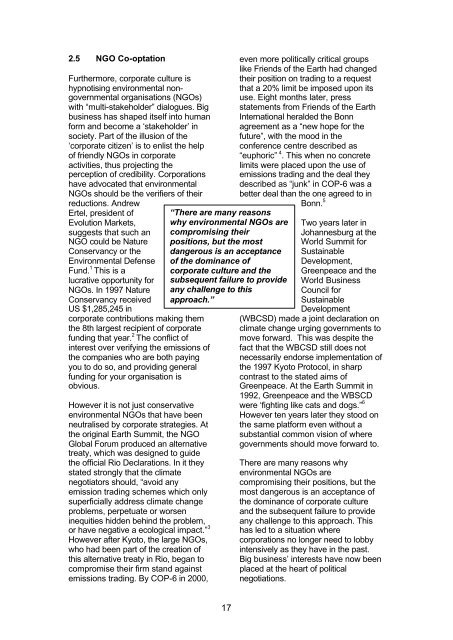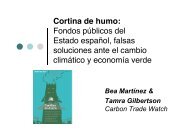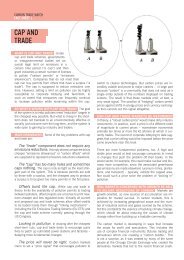The Sky is Not the Limit: - Carbon Trade Watch
The Sky is Not the Limit: - Carbon Trade Watch
The Sky is Not the Limit: - Carbon Trade Watch
- No tags were found...
You also want an ePaper? Increase the reach of your titles
YUMPU automatically turns print PDFs into web optimized ePapers that Google loves.
2.5 NGO Co-optationFur<strong>the</strong>rmore, corporate culture <strong>is</strong>hypnot<strong>is</strong>ing environmental nongovernmentalorgan<strong>is</strong>ations (NGOs)with “multi-stakeholder” dialogues. Bigbusiness has shaped itself into humanform and become a ‘stakeholder’ insociety. Part of <strong>the</strong> illusion of <strong>the</strong>‘corporate citizen’ <strong>is</strong> to enl<strong>is</strong>t <strong>the</strong> helpof friendly NGOs in corporateactivities, thus projecting <strong>the</strong>perception of credibility. Corporationshave advocated that environmentalNGOs should be <strong>the</strong> verifiers of <strong>the</strong>irreductions. AndrewErtel, president ofEvolution Markets,suggests that such anNGO could be NatureConservancy or <strong>the</strong>Environmental DefenseFund. 1 Th<strong>is</strong> <strong>is</strong> alucrative opportunity forNGOs. In 1997 NatureConservancy receivedUS $1,285,245 incorporate contributions making <strong>the</strong>m<strong>the</strong> 8th largest recipient of corporatefunding that year. 2 <strong>The</strong> conflict ofinterest over verifying <strong>the</strong> em<strong>is</strong>sions of<strong>the</strong> companies who are both payingyou to do so, and providing generalfunding for your organ<strong>is</strong>ation <strong>is</strong>obvious.However it <strong>is</strong> not just conservativeenvironmental NGOs that have beenneutral<strong>is</strong>ed by corporate strategies. At<strong>the</strong> original Earth Summit, <strong>the</strong> NGOGlobal Forum produced an alternativetreaty, which was designed to guide<strong>the</strong> official Rio Declarations. In it <strong>the</strong>ystated strongly that <strong>the</strong> climatenegotiators should, “avoid anyem<strong>is</strong>sion trading schemes which onlysuperficially address climate changeproblems, perpetuate or worseninequities hidden behind <strong>the</strong> problem,or have negative a ecological impact.” 3However after Kyoto, <strong>the</strong> large NGOs,who had been part of <strong>the</strong> creation ofth<strong>is</strong> alternative treaty in Rio, began tocomprom<strong>is</strong>e <strong>the</strong>ir firm stand againstem<strong>is</strong>sions trading. By COP-6 in 2000,“<strong>The</strong>re are many reasonswhy environmental NGOs arecomprom<strong>is</strong>ing <strong>the</strong>irpositions, but <strong>the</strong> mostdangerous <strong>is</strong> an acceptanceof <strong>the</strong> dominance ofcorporate culture and <strong>the</strong>subsequent failure to provideany challenge to th<strong>is</strong>approach.”even more politically critical groupslike Friends of <strong>the</strong> Earth had changed<strong>the</strong>ir position on trading to a requestthat a 20% limit be imposed upon itsuse. Eight months later, pressstatements from Friends of <strong>the</strong> EarthInternational heralded <strong>the</strong> Bonnagreement as a “new hope for <strong>the</strong>future”, with <strong>the</strong> mood in <strong>the</strong>conference centre described as“euphoric” 4 . Th<strong>is</strong> when no concretelimits were placed upon <strong>the</strong> use ofem<strong>is</strong>sions trading and <strong>the</strong> deal <strong>the</strong>ydescribed as “junk” in COP-6 was abetter deal than <strong>the</strong> one agreed to inBonn. 5Two years later inJohannesburg at <strong>the</strong>World Summit forSustainableDevelopment,Greenpeace and <strong>the</strong>World BusinessCouncil forSustainableDevelopment(WBCSD) made a joint declaration onclimate change urging governments tomove forward. Th<strong>is</strong> was despite <strong>the</strong>fact that <strong>the</strong> WBCSD still does notnecessarily endorse implementation of<strong>the</strong> 1997 Kyoto Protocol, in sharpcontrast to <strong>the</strong> stated aims ofGreenpeace. At <strong>the</strong> Earth Summit in1992, Greenpeace and <strong>the</strong> WBSCDwere ‘fighting like cats and dogs.” 6However ten years later <strong>the</strong>y stood on<strong>the</strong> same platform even without asubstantial common v<strong>is</strong>ion of wheregovernments should move forward to.<strong>The</strong>re are many reasons whyenvironmental NGOs arecomprom<strong>is</strong>ing <strong>the</strong>ir positions, but <strong>the</strong>most dangerous <strong>is</strong> an acceptance of<strong>the</strong> dominance of corporate cultureand <strong>the</strong> subsequent failure to provideany challenge to th<strong>is</strong> approach. Th<strong>is</strong>has led to a situation wherecorporations no longer need to lobbyintensively as <strong>the</strong>y have in <strong>the</strong> past.Big business’ interests have now beenplaced at <strong>the</strong> heart of politicalnegotiations.17











